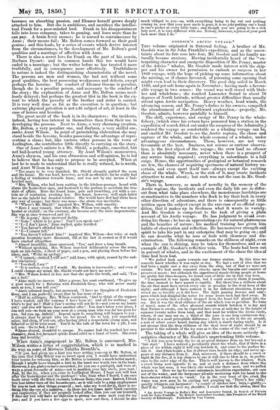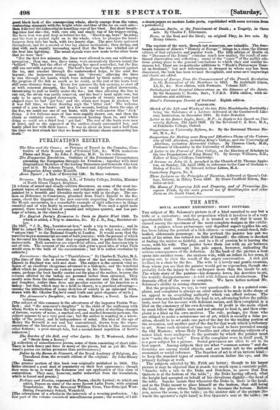GOODSIR'S ARCTIC TOYAGE. • Tiers volume originated in fraternal feeling. A
brother of Mr. Goodsir was in Sir John Franklin's expedition, and as the uncer- taintyabout its fate rose into fear, Mr. Goodsir and his family na- turally became anxious. Having incidentally heard of the " en- terprising character and energetic disposition of Mr. Penny, master of the Advice " whaler, Mr. Goodsir made interest with the skip- per and his owner for permission to embark as surgeon in her 1849 voyage, with the hope of picking' up some information about
the missing, or if chance favoured, of pursuing some opening that might even lead to their discovery. The good ship sailed in March 1849, and got safe home again in November ; having made a favour.. able voyage in two senses : the vessel was well stored with blub- ber and whalebone ; she reached Lancaster Sound in about 76
degrees of North latitude, without greater difficulties than usually attend upon Arctic navigation. Heavy weather, head winds, the advancing season, and Mr. Penny's duties to his owners, compelled. the abandonment of the Northward exploration,—properly, Mr. Goodsir, admits, however painfully to himself. The skill, experience, and energy of Mr. Penny in the whale- fishery, (which since his return have procured him a station in the expedition of search fitted out under the auspices of the Admiralty,) rendered the voyage as comfortable as a whaling voyage can be and enabled Mr. Goodsir to see the Arctic regions, the chase and. capture of the whale, and the whole economy of a whaler, under advantageous circumstances. These, however, are not very favourable at the best. Business, not science or curious observa- tion, is the first object of the voyage ; the crew land no oftener than is absolutely necessary, never when there is a prospect of any service being required ; everything is subordinate to a full cargo. Hence, the opportunities of geological or botanical research are few, the chances of acquiring specimens of natural history un- certain, and even sport itself rare—always except the exciting chase of the whale. Wreck, or the risk of it, may create incidents attractive to read about ; but suck was not the ease in Mr. Good- sir's voyage. There is, however, so much of novelty in the scenery of the Arctic regions, the incidents and even the daily life are so differ- ent from what take place elsewhere, the monotonous hardships are so unattractive to the numbers who flock to try their luck in every other direction of adventure, and there is consequently so little written, upon the subject except in the rare case of an offieial expe- dition, that it makes up in freshness what it wants in variety.. And Mr. Goodsir is competent to the task of giving a plain account of his Antic voyage. He has judgment to avoid. over- doing his theme ; he has an appreciating eye for natural phenomena and the beauties of nature ; his medical training has given him habits of observation and reflection. He has moreover strength and spirit to take his part in any enterprise that may be going on ; and he can describe what he sees or feels with clearness and dis- crimination. The following remarks on the stillness of night, even when the sun is shining, may be taken for themselves, and as an example of Mr. Goodsir's reflective vein. The boats had been out in pursuit of whales, and in the excitement of the chase the idea of time had been lost.
" We pulled back again towards our former station. By this time we scarcely knew whether it was night or day. We had a sort of idea that we- had been a night and a day away from the ship, but of that wo wore not certain. We had made repeated attacks upon the biscuits and canister of preserved meats ; but although the appetites of steady-living people at home are pretty fair time-keepers, we found ours of little use in that way here. " I suspected it was again night, but I could scarcely think it possible, the time seemed to have passed so rapidly. But there:wus a stillness about the air that must have struck every one as peculiar to the dead hour of the night ; and although I have noticed it in far different situations, it meter struck me so forcibly as it did here. The light passing breezes and cate- paws which had dimpled the water for some hours back had died away. It was now so cahn that a feather dropped from the hand fell plumb into the sea. But it was the dead stillness of the air which was so peculiar. No him of insect, none of the other pleasant gonna which betoken it is day and that Nature is awake, can be expected here even at mid-day in the-height of
summer twenty miles from and that land far within the Arctic circle, where, if one may say so, a third of the year is one long continuous day. Yet there is a most perceptible difference; there is a stir In the air around, a sort of Silent tlitA910 heard during day which is dumb during night. Is it not strange that the deep stillness of the dead hour of night should be as peculiar to the solitude of the icy seas as to the centre of the vast city ? "
The taking of a whale will give an idea of the more actively de- scriptive character of Mr. Goodsir's unpretending little volume. "A fish was seen beside the ice at no great distance from us, but beyond.a fair start.' I have noticed a peculiarity about the whale, that if there is a piece of ice within sight it will run towards it, and come to the surface be- side it. And when beside a floe it always rises beside its edge, and never ap- pears at any distance from it. And, moreover, if there should be a crack or bight in, the floe, it is ten chances to one it will riseto blow in it, in prefer- ence to the outer edge of the floe. This is well known to the whalers. Such a' rack being now opposite to us, and at such a distance from where the whale was last seen, it was likely she would rise there next, and we pulled towards it. Here we lay for genie minntesin breathless expectation, our oars out of the water, . and the harpoomersilently motioning with his hand to the- boat-deorer which way to 'scull. Up in the very 11414 of the crack the' water was now, seen to be ,eirpliatg and, gurgling up, 'There's her eddy,' quietly whiapept ow harpooner: g a epeple of strokes now, boys,—gently,— that'll do.' Looking over my shoulder, I could see first the crown, then the • An Arctic Voyage in Baffin's Bay and Lancaster Sound, in Search of Friends with Sir John Franklin. By Robert Anstruther Goodsir, late President of the Royal Society of Edinburgh. Published by Van Voorst.
great black book of the unsuspecting whale, slowly emerge from the water,
c,tiag strangely with the bright white and blue of the ice on each side thm followed theindescribable hustling roar of her blast. But short breath- ing-time had she—for, with sure aim and single tug of his trigger-string, the keen iron was sent deep in behind her fin. 'Harden up, boys!' hearwa; and the boat is pulled right on to the whale, when he plunges the hand- harpoon deep into her back, with two hearty digs. The poor brute quivered throughout, and for a second or two lay almost motionless ; then diving, and that with such vapidly increasing speed that the Fine was whirled out of the boat like lightnicq. The usual signals were now made to the other boats that we were 'fast.'
"'Per the first few minutes the lines were allowed to run out without in- terruption; then one, two, three turner were successively thrown round the 4bollard.' This had the effect of stopping her speed somewhat, but the line still ran out with a great strain. The boat's bow was forcibly pressed against the ice, and crushed through the underwashed ledge, to the solid floe beyond ; the harpooner sitting upon his thwart,' allowing the lines to run through his bands, which were defended bbyy thick mitts; stopping the progress of the fish as much as he could, as the rest of the boats were still some distance from us. Every few minutes the fish seeming to start off as with renewed strength, the bout's bow would be pulled downwards, thmatening to pull us bodily under the floe ; but then allowing the line to ran out, the strain was partly removed, and the boat's head again rose, but only to be again dragged downwards. Upwards of twenty minutes had elapsed since we had got fast,' and the strain now began to slacken : but it was full time, we were drawing nigh the ' bitter end.' The welcome sound of a gun was heard ; and in a few seconds, looking down the edge of the floe, we could see me of our boats, with the well-known blue Jack' flying. A few fathoms more of line were capidly drawn out, and then the strain as suddenly ceased. We commenced hauling them in, and whilst doing so could see a third boat ' get fast.' The rest of the boats were now at hand, and as she appeared at the surface closely surrounded her, and busily plied her with their lances. It was in about an hour and a half from the time we first struck her that we lamed the distant cheers announcing her death."



























 Previous page
Previous page